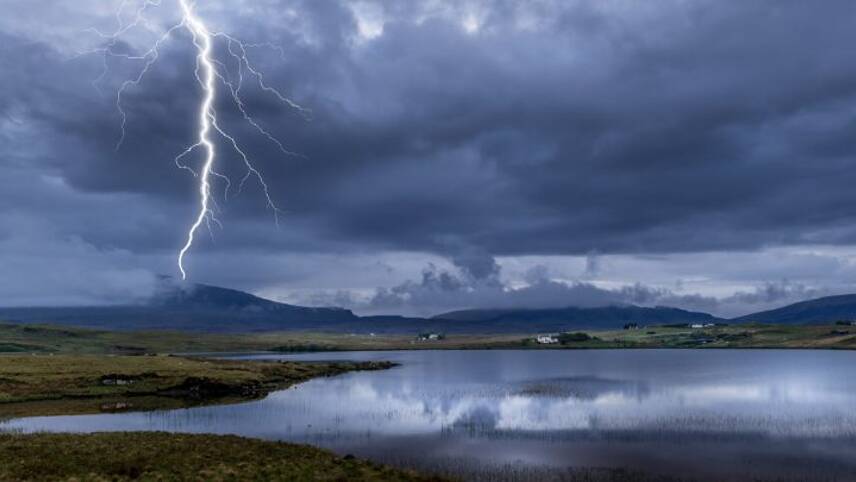Register for free and continue reading
Join our growing army of changemakers and get unlimited access to our premium content

Pictured: Stormy weather on the Isle of Skye
The Committee has today (15 March) published its latest progress report to the Scottish Parliament. The headline conclusion is that while Scotland is leading the UK in terms of reducing emissions, with annual emissions in 2019 being 43.8% lower than in 1990, there is still much work to be done on adaptation.
While the Scottish Government updated its Climate Change Adaptation Programme in 2019, with new measures through to 2024, there is still “much more to be done to translate its ambition into real-world action”, according to the CCC.
The report outlines how Scotland will not be immune to the impacts of the global temperature increase and changing weather patterns, reiterating the recent warning from the Intergovernmental Panel on Climate Change (IPCC). It states that the average temperature in Scotland is now 0.5C warmer than it was in 1990 and that Scottish winters have become 5% wetter within the same timeframe. This is already impacting infrastructure and increasing vector-borne diseases, the CCC explains in the report.
Without accelerated delivery of adaptation measures, the CCC is warning, farmland, homes and commercial buildings and infrastructure will be at risk. While the level of risk is dependent on future global decarbonisation efforts in the main, some risk is already “inevitable”, the report states.
The CCC is accusing the Scottish government of having “no credible plan” to adapt farmland at scale. It acknowledges that there is a range of plans and practices in place, with some delivering good outcomes for improved soil quality and biodiversity, but no overarching strategy to join them up. Farmland accounts for more than 70% of Scotland’s land area and 2.5% of the Scottish population is employed within the agriculture sector.
On infrastructure and buildings, the CCC has concluded that Scotland does have plans in place, but that detail remains “insufficient” in some regards and that delivery of plans is not happening quickly enough. Its report warns of extreme weather and flooding risks for existing ports, airports, energy infrastructure and ICT infrastructure. It also urges the Scottish Government to begin collecting data on the number and location of new properties built within flood-risk areas and to work more closely with local authorities on the management of coastal erosion risks. To this latter point, the sea level around the Scottish coast has increased by some 3cm each decade for the past three decades.
The insufficiencies identified by the CCC are largely due to the lack of “clear, time-bound and quantitative targets” with “clear” ownership, the CCC is warning. It is acknowledged that this may be, in part, down to poor data collection and monitoring. These same criticisms have been levelled at the UK Government in its handling of the key policy packages underpinning the 2050 net-zero target, including the Net-Zero Strategy.
Baroness Brown, who chairs the CCC’s adaptation committee, said the Scottish Government must “build on examples of good practice” and “up its game” on climate resilience.
She said “We commend the Scottish Government on its vision for a climate-ready Scotland, but the reality is that action is not happening at the scale or pace required. In most sectors including the natural and built environments, health, infrastructure and business, action has stalled. Without a renewed sense of urgency, the significant changes we are already seeing in Scotland today will have impacts on all areas of Scottish society and nature in the years to come.
Spotlight on business
Last month, CCC chief executive Chris Stark outlined the Committee’s programme of work for 2022. Stark promised the provision of additional guidance on finance and business, among other themes.
Today’s report builds on those commitments. It concludes that the Scottish Government is not adequately planning for how climate change will impact business’s operations and supply chains, and that it would do well to learn from the Glasgow City Region’s economic strategy, which does quantify and include measures to respond to these risks.
The forthcoming mandate for large businesses to measure and disclose climate risks, coming into force in April 2022, may help to bridge some data gaps. But the CCC is advocating for the government to take a national approach, too.
As well as improving risk management, the report encourages the Government to communicate the economic opportunity of climate adaptation to businesses, arguing that this opportunity is not currently widely known across Scotland’s private sector. Knowledge is largely concentrated within nature-related and cleantech sectors.
Recommended in the report is an assessment of the opportunities that climate mitigation and adaptation would deliver for business, and research into current barriers faced by businesses.
Readers interested in the issues discussed in this article are encouraged to read edie’s feature entitled: ‘Is UK Plc ignoring climate resilience on the road to net-zero?’
Sarah George


Scottish Government in "no credible plan" shocker
Now why doesn’t that come with any surprise?